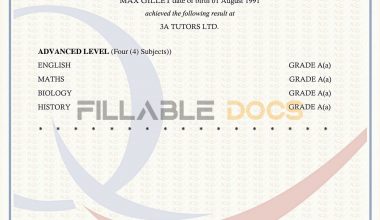If you’ve recently received your GCSE results and you’re not happy with your grades, you may be wondering if there’s anything you can do about it. Fortunately, there are options available to you, including requesting a remark for your GCSE.
So to answer the question ” Can you get a GCSE remark? The answer is yes, it is possible to have a GCSE exam remarked.
A remark is when your exam paper is reviewed by a senior examiner to ensure that it has been marked correctly.
Sometimes, examiners make mistakes, leading to errors in marking and wrongly changing your grade. If you believe there are any mistakes in the marking, you can request a remark on your exam papers.
However, keep in mind that sometimes grades might get lowered after a remark, so it’s better to consult with a teacher if it’s worth it or not.
Our article will explore all there is to know about remarking GCSEs, how to request a remark for your GCSE grade, and factors you must consider before asking for a remark.
Table of contents
What is GCSE Remark?
If you are not satisfied with your GCSE grade, you can ask for a remark. A GCSE remark is a process of requesting a review of a GCSE grade assigned by an exam board.
The process is usually initiated by the secondary school student or their parents, who believe that their grade is an unfair representation of what they demonstrated in the exam.
A GCSE remark is not a re-sit of the exam. Instead, it is a review of the marking of the exam paper. The examiner will re-check your exam paper to ensure that all the answers have been marked and that the marks have been added up correctly.
Check Out: When Should You Start Revising For Your GCSEs?
Types of GCSE Remark
There are two types of GCSE remark:
Clerical check: A clerical check is a review of the administrative processes involved in the marking of your exam paper. This includes checking that all the pages of your exam paper have been marked, that the marks have been added up correctly and that the total mark has been transferred to the correct place on the mark scheme.
Review of marking: A review of marking is a review of the marking of your exam paper. This includes checking that all the answers have been marked, that the marks have been added up correctly and that the marks have been awarded per the mark scheme.
Note that the GCSE remark is not always successful. The exam board may decide that the original mark was correct, or they may decide to lower the mark. However, if the exam board decides to increase your mark, they will issue a new certificate with the revised grade.
To request a GCSE remark, you will need to contact your school or college. They will be able to advise you on the process and the cost of the remark. The deadline for requesting a remark is usually around mid-September, so it is important to act quickly if you are considering a remark.
How to Request a GCSE Remark
If you’re not satisfied with your GCSE results, you can request a remark on your exam. Here’s how you can do it:
- Contact your school or college: The first step is to contact your school or college and ask them to request a remark on your behalf. They can request that the exam board review the marking of your exam entry. They will also be able to advise you on the process and the cost of requesting a remark.
- Request a review from Ofqual: If you’re not satisfied with the outcome of the remark, you can request a review from Ofqual. Ofqual is the regulator of qualifications, exams, and assessments in England. They can review the process followed by the exam board to ensure that it is fair and consistent.
- Understand the deadlines and fees: It’s important to understand the deadlines and fees associated with requesting a remark. The deadline for requesting a remark is usually within 30 days of the GCSE results day. The cost of a remark varies depending on the exam board and the number of papers being remarked. You can find more information on the exam board’s website.
- Consider the risks: Consider the risks of requesting a remark. Sometimes, grades might be lowered after a remark, so it’s important to consult with a teacher to determine whether it’s worth it. Additionally, there is no grade protection for a review of marking.
- Be patient: Remarking can take up to 3 weeks or sometimes more. It’s important to be patient and not to stress too much about the outcome.
Factors to Consider Before Requesting a Remark
If you are considering requesting a GCSE remark, there are several factors that you should take into account before making a decision. Here are some things you should consider:
1. Consult with Your Teacher
Before requesting a remark, it’s a good idea to consult with your teacher to get their opinion on whether it’s worth it or not. They will be able to advise you on the likelihood of your grade changing and whether it’s worth the cost.
2. Exam Conditions
If you believe that the exam conditions were not fair or that there were issues with the administration of the exam, you may have grounds for requesting a remark. However, keep in mind that this is a rare occurrence and will require evidence to support your claim.
Find Out What is a Pass Grade at GCSE and A Level?
3. Marking Errors
Sometimes, examiners make mistakes when marking papers, which can result in incorrect grades. If you believe that your paper was not marked correctly, you can request a remark. However, keep in mind that there is a chance that your grade could go down as well as up.
4. Insufficient Marks
If you received a grade that was close to the next grade boundary, it may be worth requesting a remark. However, keep in mind that there is no guarantee that your grade will change.
5. Cost
It’s important to consider the cost of a remark before making a decision. Remarking on one exam paper costs around £35, and the cost can add up if you request multiple remarks. Keep in mind that you will only be refunded if your grade changes, so there is a risk that you will be out of pocket.
A GCSE remark is a big decision that should not be taken lightly. Consider the factors above before making a decision, and consult with your teacher to get their opinion.
The Process of GCSE Remark
If you are not satisfied with your GCSE grade, you have the option to request a remark. The process of GCSE remark involves several steps that are outlined below.
Initial Review
The first step in the GCSE remark process is to request an initial review. You do this by contacting your school or exam board and requesting a review of your exam paper. During the initial review, the examiner will check to make sure that all questions have been marked and that the marks have been added up correctly.
Mark Adjustment
If the initial review reveals errors in marking, the examiner will adjust your marks accordingly. This may result in a change in your overall grade. However, if the examiner confirms that your marks are correct, your grade will remain the same.
See Also; When Do You Do Your GCSEs? Everything You Need to Know
Result Notification
Once the remark process is complete, you will receive a notification of your new grade, if applicable. Your school will receive the notification and inform you of the outcome.
It’s important to note that the GCSE remark process can take several weeks to complete. Additionally, there is a fee associated with requesting a remark, which varies depending on the exam board.
The process involves an initial review, mark adjustment if necessary, and result notification. It can take time and is associated with a fee.
Potential Outcomes of a GCSE Remark
If you are considering requesting a GCSE remark, understand the potential outcomes. While there is a chance that your grade will improve, there is also a risk that it could stay the same or even decrease. Here are some possible scenarios:
- Your grade increases: If the examiner discovers an error in your original marking, your grade could increase. According to Think Student, around 18% of GCSE remarks result in a grade change. If your grade is raised as a result of a GCSE remark, the examination board will refund the cost of the remark.
- Your grade stays the same: The examiner may review your work and find that your original grade was correct. In this case, your grade will remain the same. Keep in mind that you will not be reimbursed for the cost of the remark if your grade does not change.
- Your grade decreases: While it is rare, there is a chance that your grade could decrease as a result of a GCSE remark. According to Mumsnet, an odd script may go down 1 or 2 marks but keep the same grade. Therefore, it is important to consider whether a remark is worth the risk carefully.
There is no grade protection for a review of marking. This means that your grade could potentially decrease as a result of a remark. However, if you feel that your original grade was unfairly low, a GCSE remark may be worth considering. Just be aware of the potential outcomes before making a decision.
Cost Implications of a GCSE Remark
The cost of a GCSE remark varies depending on the exam board and the subject. Usually, the cost of a remark is upward of £30. You should consider your budget. More importantly, you should be completely confident that the paper deserves more marks.
Also, if your grade is raised as a result of a GCSE remark, the examination board will refund the cost of the remark. However, if your grade remains the same or is lowered, you will not be reimbursed for the cost of the remark. This means that you could potentially lose money if your grade stays the same.
Other costs are associated with a GCSE remark, such as the time and effort required to request and follow up on the remark. You will need to fill out a form, pay the fee, and then wait for the results of the remark. This can take several weeks, which can be stressful if you are waiting for university or college admission decisions.
Read Also: How Many GCSEs Do Students Take? 2024 Complete Guide
Alternatives to GCSE Remark
If you are not satisfied with your GCSE results but do not want to go through the remark process, there are several alternatives you can consider. Here are some of them:
Resit the Exam
One option is to resit the exam. If you feel that you did not perform to the best of your ability on the day of the exam, or if you were ill or had personal issues that affected your performance, you can choose to resit the exam. This will give you another chance to achieve the grade you want.
Appealing the Grade
If you believe that your grade is incorrect due to administrative or procedural errors, you can appeal your grade. You can only appeal if there has been an error in the way your exam was marked or if there was a mistake in the way your grade was calculated. You cannot appeal if you disagree with the grade you have been given.
Taking a Different Qualification
If you are unhappy with your GCSE results, you could consider taking a different qualification. There are many other qualifications available, such as vocational qualifications, apprenticeships, and BTECs. These qualifications may suit your learning style or career aspirations better than GCSEs.
Private Candidates
If you are not happy with your school or college and feel that they did not support you adequately, you could consider becoming a private candidate. This means that you would study independently and take the exam at an exam center. This option is not for everyone, but it may suit those who prefer to work independently or who have specific learning needs.
Functional Skills
If you did not achieve a grade 4 or above in English or maths, you may be able to take a functional skills course instead. Functional skills are practical skills in English and maths that are useful in everyday life and work. They are available at different levels and can be taken at any age.
Consider all of your options carefully and seek advice from your school or college before making any decisions.
Read Also: GCSEs or GCSE’s: Which is Correct and Why?
FAQS
If you fail a GCSE, you will have the opportunity to resit the exam in November or the following summer. You can also retake individual subjects or retake the entire suite of exams, depending on your situation and goals.
If you fail your English or Maths GCSEs, it will be compulsory for you to resit the exams or take a foundation course at a higher education level.
Failing a GCSE does not mean that you are not intelligent or capable. There are many reasons why a student might fail an exam, such as illness, family problems, or difficulty with the subject matter.
A GCSE is considered a fail if you receive a grade of 3 or below. A grade 4 is a standard pass, and a grade 5 is a strong pass.
No, you cannot get an F in GCSE. The GCSE grading system is numbered 9-1, with 9 being the highest grade and 1 being the lowest. A grade of 3 or below is considered a fail.
Conclusion
Asking for a remark after receiving your GCSE result is your right as a student. However, you must understand that there are no promises that your grades will change.
In some cases, you might even receive a lower grade after a remark. This is why you must be sure you got shortchanged before appealing or asking for your GCSE to be remarked.
Good luck.
Additional Resources
- GCSE Grade Boundaries Explained | Expert Tips
- IGCSE vs GCSE: Which is Harder and Why?
- The 15 Best GCSEs to Take (Student Opinion)
- What Happens If You Do Worse in a GCSE Resit?
- Is Computer Science GCSE Hard? GCSE Computer Science Guide






